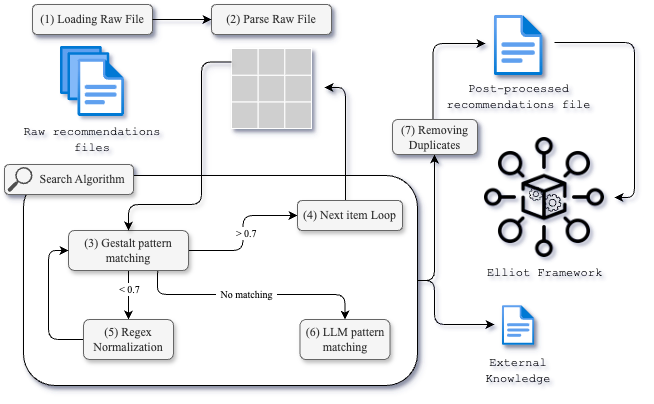Evaluating ChatGPT as a Recommender System
Official source code and datasets for ChatGPT as a Recommender System

The evaluation pipeline for assessing ChatGPT's performance as a recommender system.
Project Overview
This project provides the official source code and datasets accompanying the paper “Evaluating ChatGPT as a Recommender System: A Rigorous Approach.” It explores the potential of ChatGPT-3.5 and ChatGPT-4 models in zero-shot recommendation scenarios, offering a comprehensive framework for experimentation and evaluation.
Features
- Zero-Shot Recommendations: Leverages ChatGPT models to generate recommendations without prior training on specific datasets.
- Baseline Comparisons: Includes implementations of traditional recommender system baselines for performance benchmarking.
- Extensive Datasets: Provides datasets necessary for conducting experiments, including MovieLens and Facebook Book datasets.
- Evaluation Pipeline: Offers a structured pipeline to facilitate reproducible experiments and evaluations.
Usage
To set up and run the experiments:
- Clone the Repository:
git clone https://github.com/sisinflab/Recommender-ChatGPT.git - Set Up the Environment: Ensure Python 3.8.6 or later is installed. Create a virtual environment and install dependencies:
conda env create -f conda_env/env.yml conda activate Recommender-ChatGPT - Insert OpenAI API Token: Obtain an API token from OpenAI and insert it into the appropriate configuration file.
- Run the Evaluation Pipeline: Execute the main script to start the experiments:
python code/main.pyResults will be stored in the
resultsfolder.
Dependencies
- Python: Version 3.8.6 or later
- Conda: For environment management
- OpenAI API: Access to ChatGPT models
- Elliot: Framework for recommender systems evaluation
- Pandas: Data manipulation and analysis
- NumPy: Numerical computing
Links
- GitHub Repository
- Paper: Evaluating ChatGPT as a Recommender System: A Rigorous Approach
- Information Systems Lab @ Polytechnic University of Bari
For detailed information and updates, please refer to the GitHub repository.